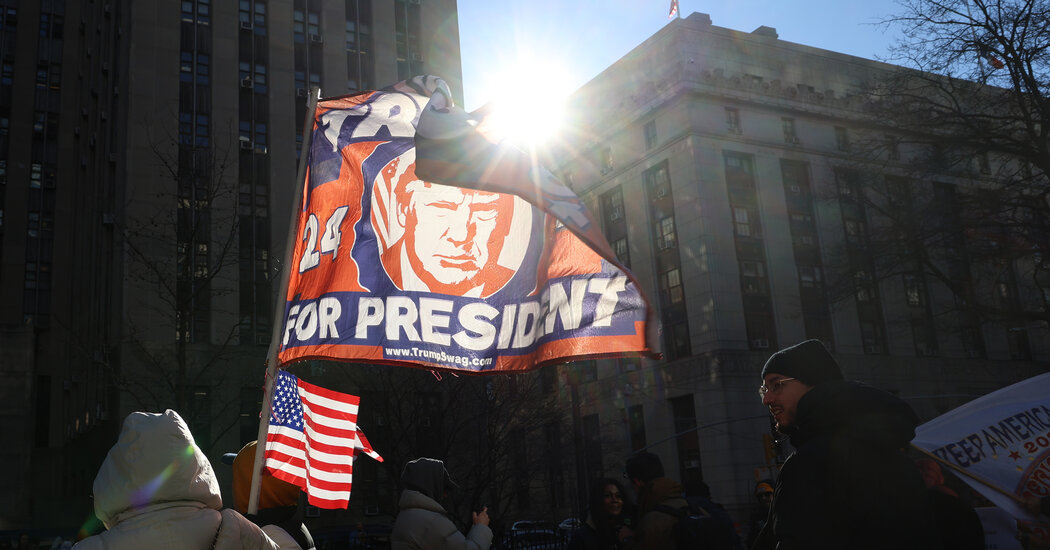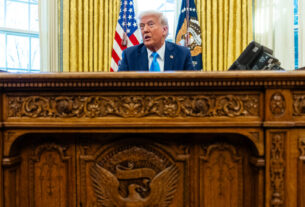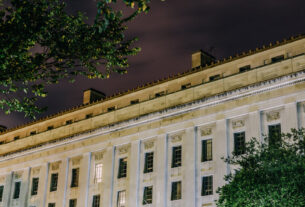Unlike Donald J. Trump’s criminal trial, which lasted seven dramatic weeks, his sentencing Friday was brief.
One day after Mr. Trump sat with other former presidents at Jimmy Carter’s funeral, he appeared in court via a video screen in front of two American flags. About thirty minutes later, he was officially deemed a felon.
The president-elect was convicted in May of 34 counts of falsifying business records related to a scheme to cover up a sexual encounter with a porn star, a salacious story that threatened to derail his 2016 presidential campaign.
Here are five takeaways from Mr. Trump’s sentencing:
Dramatic trial, subdued sentencing.
Mr. Trump’s trial, which culminated in a guilty verdict in May, was a dramatic affair complete with the intimate details of a scandal, tearful testimony from a former aide and ruthless cross-examinations, including that of Mr. Trump’s former lawyer and fixer Michael Cohen.
But on Friday, the sentencing was largely symbolic and predictable. Mr. Trump received an unconditional discharge, a rare sentence in New York courts that doesn’t subject him to jail time or any other requirements.
While the events were not surprising, they were without precedent: Mr. Trump will be the first felon to occupy the Oval Office when he is inaugurated in 10 days.
The election was treated as a trump card.
Joshua Steinglass, a prosecutor with the Manhattan district attorney’s office, said he was only recommending the unconditional discharge because of Mr. Trump’s status as president-elect.
“The defendant sees himself as above the law and won’t accept responsibility for his actions,” Mr. Steinglass said, quoting a presentencing report that would normally carry significant importance.
Trump’s lawyer, Todd Blanche, was staid, a marked contrast to the showmanship he displayed during the trial. Mr. Blanche — who has been tapped to become deputy attorney general — took aim at the mere existence of the trial, arguing that the jury’s verdict “presupposes that the case is legally appropriate.”
“The majority of the American people also agree that this case should not have been brought,” Mr. Blanche said, referring to Mr. Trump’s election victory.
Trump remained defiant until the end.
Mr. Trump’s frustration with the prosecution remained on full display on Friday. He shook his head as the court reiterated his conviction and crossed his arms in defiance when Mr. Steinglass referred to his “disdain” for the rule of law.
Mr. Trump then addressed the court for just over six minutes, maintaining his innocence and claiming that he was targeted by political opponents and that the Justice Department had somehow propelled the case. He also got in a final jab at Mr. Cohen — the prosecutor’s star witness — whom he called “a totally discredited person.”
“It was an injustice of justice,” said Mr. Trump before he was formally sentenced, adding. “I was treated very, very unfairly.”
Justice Merchan got the last word.
There was a lot that Justice Merchan could have said.
During the seven-week trial, the judge was accused by Mr. Trump’s of being “biased” and “corrupt.” Mr. Trump violated a gag order, resulting in $10,000 in fines. The judge’s daughter, a Democratic political consultant, received a multitude of threats after Mr. Trump complained about her.
Instead, Justice Merchan used his final time addressing Mr. Trump to justify his punishment. Calling an unconditional discharge the “only lawful sentence” he could hand down, he distinguished Mr. Trump the individual from Mr. Trump the president-elect. The office of the president shielded him, Justice Merchan said.
As Justice Merchan left the bench, the judge wished the soon-to-be president “godspeed.”
It isn’t over.
Mr. Trump had already filed motions challenging the case through a constellation of courts and began a civil action against Justice Merchan.
But now that he has been sentenced, he can mount a formal appeal attacking the merits of the prosecutor’s case and the judge’s rulings.
The process could take months or years and will continue well into his second term in office.





